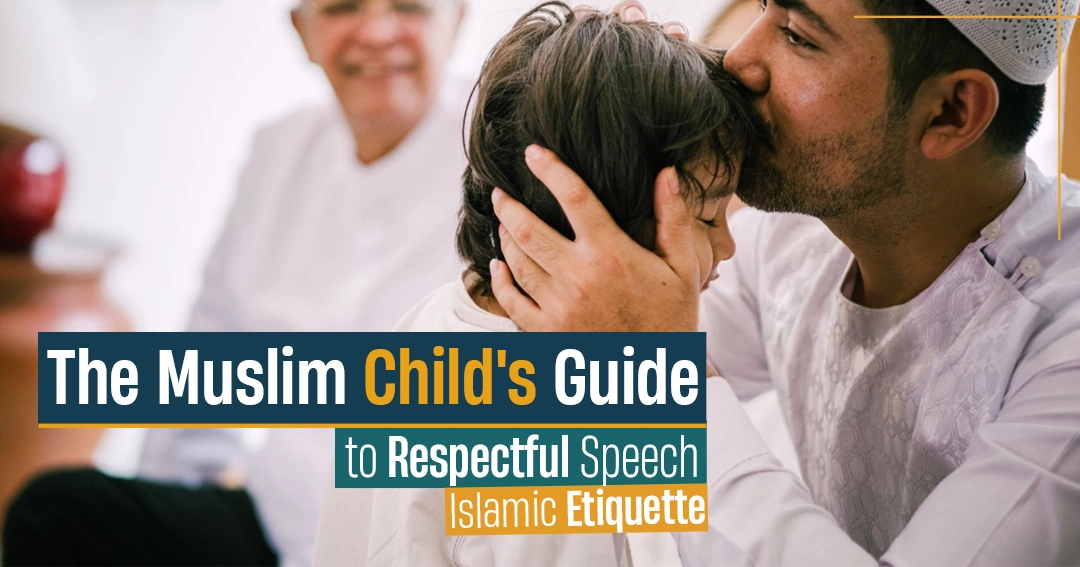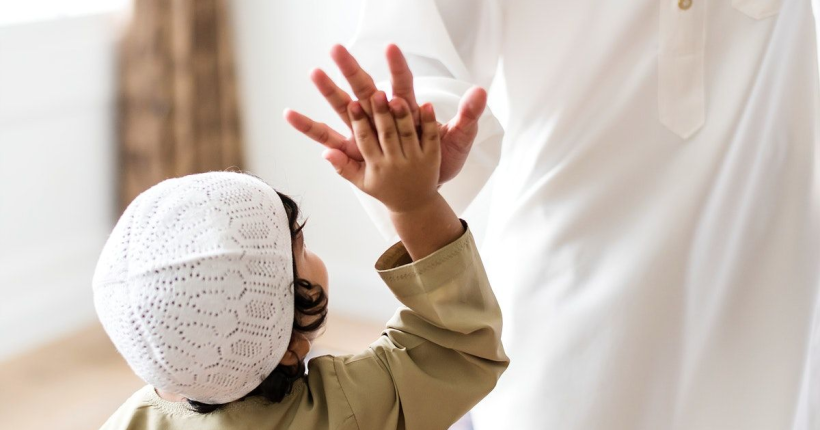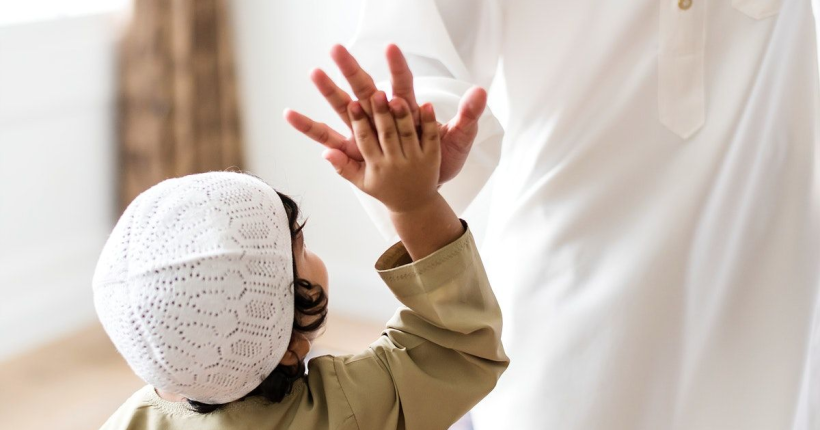Teaching kids proper Islamic way of talking is one of the best things that parents and teachers can give to young Muslims. Our words dictate not only how people view us but also how we view Allah and each other.
This article will help you develop respectful speech and good Islamic manners for kids, building a strong foundation of Islamic etiquette that will endure for a lifetime.
The Value of Respectful Speech in Islam

When teaching kids proper Islamic way of talking, one of the first things to teach them is the value of respectful speech in Islam. Islam places great value on what we say, and educating kids accordingly both build their manners and their deen. Respectful speech isn’t merely good manners, it’s an act of ibadah.
1. The Quran Encourages Noble Speech
Allah repeatedly reminds us in the Quran to speak in a kind and honorable way. For example, in Surah Al-Isra (17:53), Allah says,
“And tell My servants to say that which is best.”
When teaching kids proper Islamic way of talking, this ayah is a powerful foundation. Children should understand that every word they say is important, not only in people’s eyes but in Allah’s eyes.
2. The Prophet Muhammad (ﷺ) as a Role Model in Speech
Another beautiful thing about teaching kids proper Islamic way of talking is informing them about the Prophet Muhammad (peace be upon him). His speech was always truthful, wise, and kind. The Prophet said:
“Whoever believes in Allah and the Last Day should speak good or remain silent.” (Bukhari & Muslim)
3. Respectful Speech Builds Taqwa in Children
When we’re focused on teaching kids proper Islamic way of talking, it’s important to highlight the spiritual benefits too.
Respectful speech teaches self-control, humility, and compassion, all key elements of taqwa (God-consciousness). A child who learns to think before speaking is more mindful of their actions and closer to embodying Islamic manners in every part of life.
How to Teach Kids the Proper Islamic Way of Talking?

Now that we have learned the significance of respectful speech, let’s discover some practical tips for teaching kids proper Islamic way of talking. These simple actions will teach children polite, kind, and faith-based communication.
1. Encourage Kind and Gentle Words
An easy and effective way of starting teaching kids proper Islamic way of talking is to have them use good words daily. Good words like please, thank you, and jazakAllahu khairan (may Allah reward you) convey gratitude and respect.
2. Teach Truthfulness and Honesty
Islam places a high quality on truthfulness, and early teaching of this aids the child in developing trust and sound character. When teaching kids proper Islamic way of talking, emphasize telling the truth at all times, even if it is hard to do so.
Teaching about honesty through stories from the Prophet’s life and through easy role-playing exercises offered by Tareequl Jannah Academy can be made interesting and memorable for children.
3. Teach Islamic Greetings and Duas
The use of Islamic greetings and prayers in daily speech is a beautiful means of integrating faith and speech. Encouraging children to use Assalamu Alaikum (peace be upon you), Insha’Allah (God willing), Alhamdulillah (praise be to Allah), and Masha’Allah (as Allah wills) reminds them to think about Allah during the day.
These foundation phrases are taught at Tareequl Jannah Academy with brief explanations and fun practice sessions so that children can confidently naturally apply them.
4. Help Children Stay Away from Gossip and Hurtful Words
Teaching kids proper Islamic way of talking involves keeping them away from negative speech like gossip, slander, or hurtful words. Explain gently what backbiting means and how it hurts others, using stories and examples that are relatable to their age.
Interactive classes at Tareequl Jannah Academy provide children with strategies on how to avoid negative speech and replace it with positive, respectful speech.
Practical Tips and Activities

Practicing is the best way of allowing children to absorb Islamic speech etiquette. The following are easy, enjoyable, and simple tips and activities that parents and teachers can follow when teaching kids proper Islamic way of talking.
These methods make learning enjoyable and effective and encourage children to naturally acquire respectful communication habits.
1. Storytelling with Islamic Lessons
Using Stories when teaching kids proper Islamic way of talking captures children’s attention and helps them remember useful principles. Use stories from the Prophet’s life (Seerah) or other Islamic stories to demonstrate respectful speech and manners.
Pause in the middle of the story and ask, “How did the Prophet speak nicely here?” or “What can we say instead of abusive language?”
Tareequl Jannah Academy programs have storytelling sessions that combine faith and manners, making it easier for children to relate to what is being taught.
2. Role-Playing and Speech Practice
Role-playing common social situations enables children to rehearse the Islamic way of speaking in a safe and loving atmosphere. For example, parents can create scenarios where children role-play greeting guests, asking politely, or responding kindly to criticism.
This hands-on approach supports learning and builds confidence. Tareequl Jannah Academy offers interactive classes in which children can engage in role-play exercises with the help of professional instructors.
3. Create a Speech Etiquette Chart or Reward System
Use Visual cues when teaching kids proper Islamic way of talking. For instance, a speech etiquette chart can remind children of the words and actions they should use daily. Include items like “Say please and thank you,” “Use kind words,” and “Speak the truth.”
Couple this with a simple reward system—stickers or points for good speech—that motivates children to practice daily. Most parents find that materials recommended by Tareequl Jannah Academy get kids excited about learning Islamic manners.
4. Encourage the Daily Use of Islamic Phrases
Make teaching kids proper Islamic way of talking a practice to have kids use phrases like Assalamu Alaikum, Alhamdulillah, Insha’Allah, and JazakAllah Khairan throughout the day. Remind them gently and compliment them when they do it on their own.
If you found this article useful don’t forget to share it with your friends and family.
Help Your Child Grow with Beautiful Islamic Manners
Looking for practical ways to raise well-mannered, confident Muslim children? Explore our enriching collection of articles designed to teach kids the essential Islamic values every young Muslim should know.
From learning Islamic manners for children and building strong Islamic character to mastering Islamic hygiene rules and masjid etiquette, each article is crafted to make Islamic teachings simple, relatable, and engaging for kids.
Plus, don’t miss the timeless wisdom of the Prophet ﷺ in our guide on Prophet Muhammad stories about manners for kids, and help your child learn the rights of neighbors in Islam and the proper Islamic way of speaking with love and respect.
Start reading now and guide your child toward becoming a well-rounded Muslim with beautiful adab and character.




